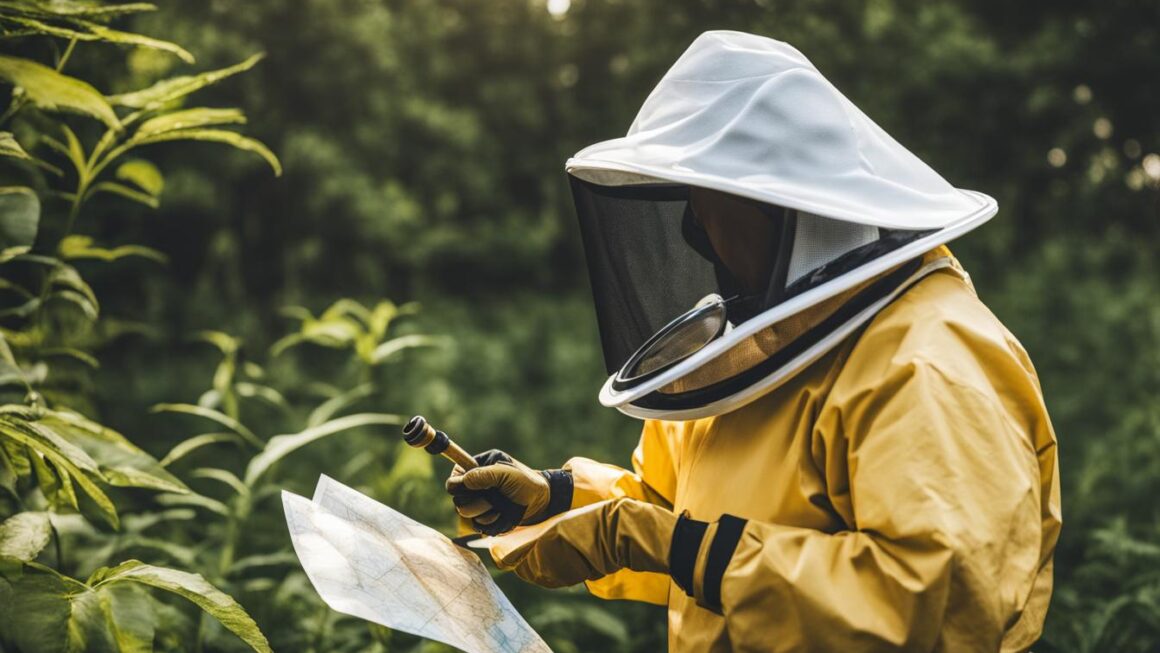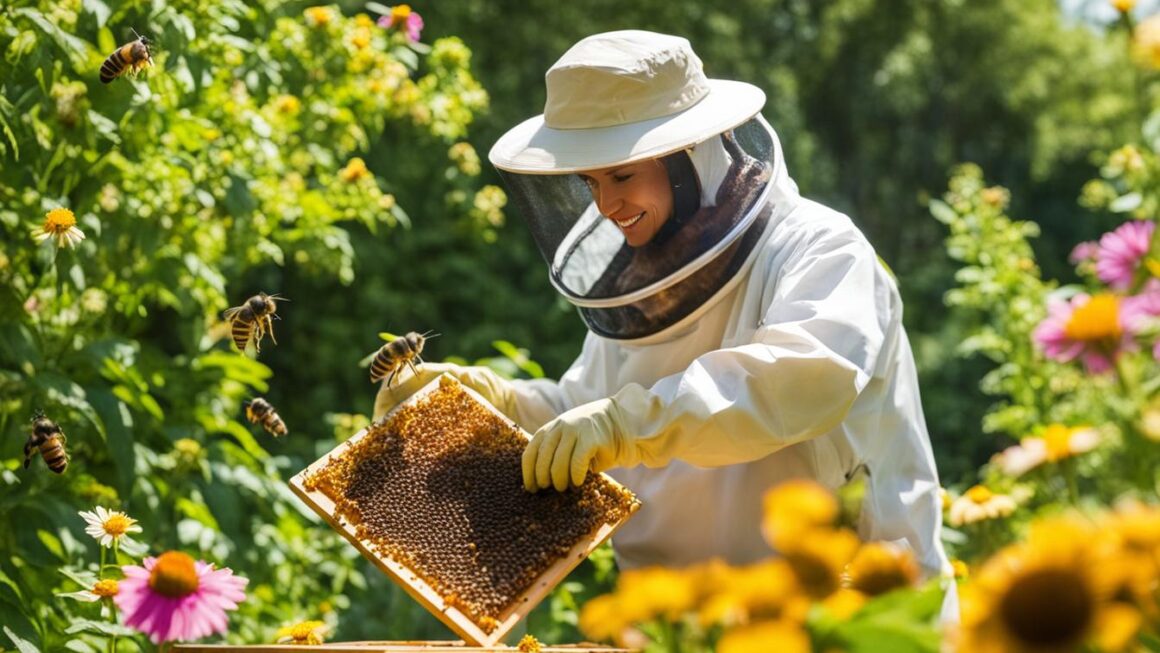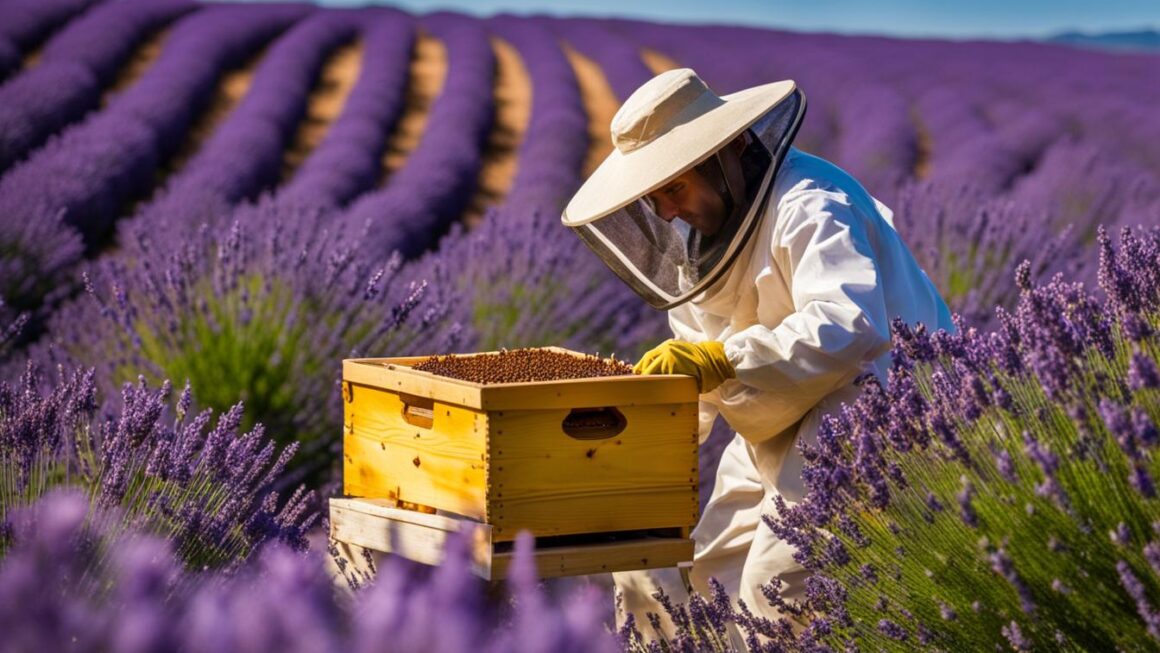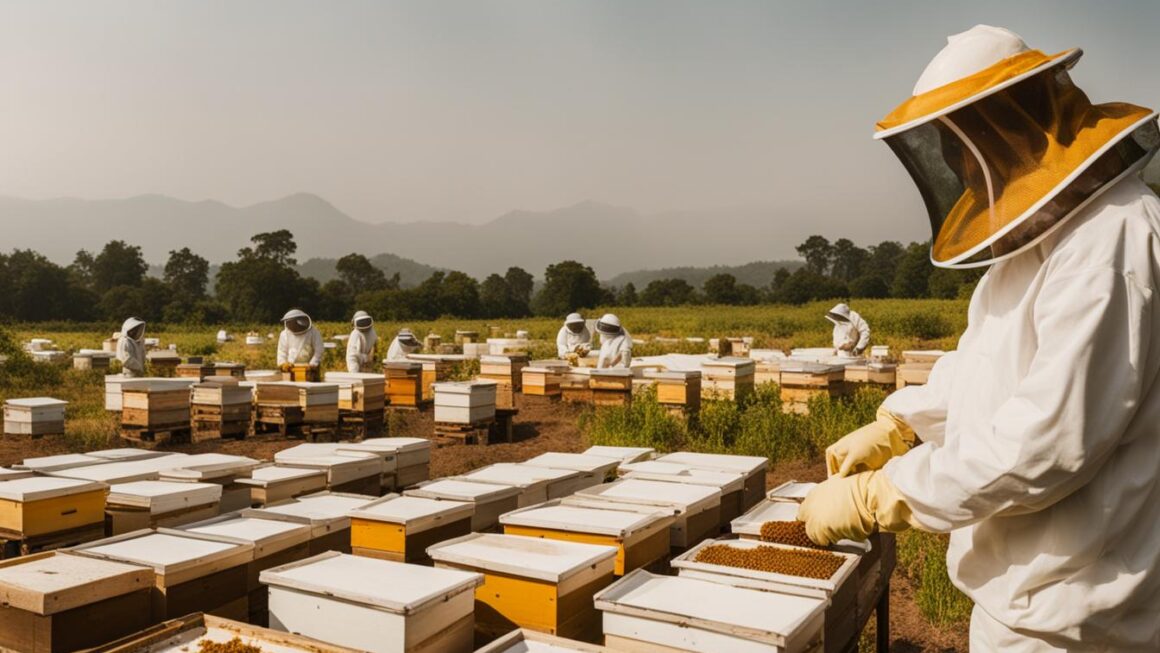Are you passionate about beekeeping and looking for financial support to pursue your passion? Look no further! In this comprehensive guide, we will explore various grants and funding options available to beekeepers in the United States. Whether you need insurance coverage, disaster assistance, loans, or grants, we’ve got you covered. Let’s dive in!
Key Takeaways:
- USDA offers insurance programs, disaster assistance programs, loan programs, and grants to support beekeepers.
- Insurance programs like the Apiculture Rainfall Index Insurance Program and Whole-Farm Revenue Protection provide coverage for beekeeping-related losses.
- USDA disaster assistance programs offer financial support for beekeepers affected by natural disasters.
- Loan programs such as the Farm Loan Program and Farm Storage Facility Loan Program assist beekeepers with financing their operations.
- Grants provided by USDA, Centene Charitable Foundation, Costco Wholesale, and Hearst Foundations can be accessed for beekeeping projects and related initiatives.
USDA Insurance Programs for Beekeepers
Beekeeping is a passion that requires financial support to ensure its viability. Fortunately, the United States Department of Agriculture (USDA) offers insurance programs specifically tailored for beekeepers. These programs are designed to strengthen the economic stability of beekeepers and rural communities. Two noteworthy insurance programs provided by the USDA are the Apiculture Rainfall Index Insurance Program (RI-API) and the Whole-Farm Revenue Protection.
The Apiculture Rainfall Index Insurance Program (RI-API) offers coverage for various components of beekeeping, including honey, pollen collection, wax, and breeding stock. This insurance program takes into account the rainfall index, which affects the availability of forage for bees. By protecting beekeepers’ investments against unpredictable rainfall patterns, they can mitigate potential losses and ensure their resources are safeguarded.
The Whole-Farm Revenue Protection insurance policy is another valuable option for beekeepers. This comprehensive insurance coverage extends to all commodities produced on the farm, including honey. With this insurance program, beekeepers have peace of mind knowing that their entire farm’s revenue is protected, providing a safety net for unforeseen circumstances that may impact their livelihood.
The USDA’s insurance programs for beekeepers are essential tools for managing risks and uncertainties in the industry. These programs offer financial security and stability, enabling beekeepers to pursue their passion for beekeeping with confidence.
USDA Disaster Assistance Programs for Beekeepers
The United States Department of Agriculture (USDA) offers a range of disaster assistance programs specifically designed to support beekeepers who have been affected by natural disasters. These programs provide financial assistance to help beekeepers recover from losses and overcome the challenges brought about by adverse weather events.
The first program is the Emergency Livestock Assistance Program, which provides eligible beekeepers with financial support for losses incurred due to adverse weather events, excluding drought for honey bee colonies. This program aims to help beekeepers rebuild their colonies and mitigate the financial impact of weather-related losses.
The second program is the Noninsured Crop Disaster Assistance Program, which offers financial assistance to beekeepers for losses caused by natural disasters that are not covered by other USDA assistance programs. It provides a safety net for beekeepers who have experienced crop damage or loss due to events like floods, hurricanes, or wildfires.
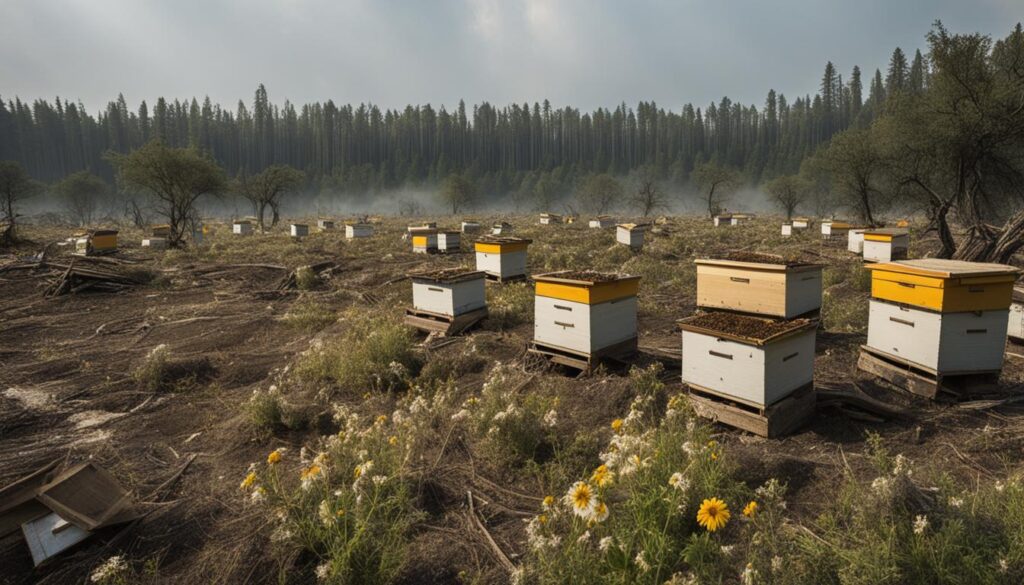
Table: USDA Disaster Assistance Programs for Beekeepers
| Program | Description |
|---|---|
| Emergency Livestock Assistance Program | Provides financial assistance for eligible adverse weather events and losses, excluding drought, for honey bee colonies. |
| Noninsured Crop Disaster Assistance Program | Offers financial assistance for losses incurred by natural disasters not covered by other USDA assistance programs. |
These USDA disaster assistance programs for beekeepers aim to provide support and financial relief during times of crisis. By offering assistance to beekeepers affected by natural disasters, the USDA plays a vital role in ensuring the resilience and sustainability of the beekeeping industry.
USDA Loan Programs for Beekeepers
Beekeeping is a passion that requires financial investment. The United States Department of Agriculture (USDA) recognizes the importance of supporting beekeepers and offers various loan programs specifically tailored to meet their needs.
The USDA Farm Loan Program is one such program that provides guaranteed loans to beekeepers engaged in honey production. These loans can be used to assist in building overwintering colony storage facilities. The program aims to enhance the productivity and sustainability of honey production operations.
Another loan program offered by USDA is the Farm Storage Facility Loan Program. This program provides low-interest financing for beekeepers to build or upgrade facilities for storing commodities, including honey. By improving storage capabilities, beekeepers can ensure the quality and preservation of their products while also expanding their operations.
USDA Loan Programs for Beekeepers
| Loan Program | Description |
|---|---|
| Farm Loan Program | Guaranteed loans for honey production and overwintering colony storage facilities. |
| Farm Storage Facility Loan Program | Low-interest financing for building or upgrading commodity storage facilities. |
In addition to these loan programs, beekeepers can also benefit from other USDA loan programs like the Microloan Program and Emergency Loan Program. These programs are designed to meet the financial needs of small and mid-sized family operations, providing them with the necessary resources to thrive in the beekeeping industry.
By tapping into these USDA loan programs, beekeepers can access the necessary financial support to strengthen their beekeeping operations, expand their businesses, and continue pursuing their passion for beekeeping.
USDA Grants for Beekeepers
Beekeepers can access financial support through various grant programs offered by the United States Department of Agriculture (USDA). These grants aim to assist beekeepers in the development and expansion of their operations, as well as promote innovation within the industry.
One such grant program is the Local Agriculture Market Program (LAMP), which provides funding for the development and expansion of direct producer-to-consumer marketing and value-added agricultural products. Beekeepers can utilize LAMP grants to improve their marketing strategies and enhance the visibility of their honey and hive products in local markets.
Another valuable grant program available to beekeepers is the Small Business Innovation Research (SBIR) Program. This program supports small businesses in the research and development of innovative technologies that can benefit the beekeeping industry. Through SBIR grants, beekeepers can explore new solutions to challenges they face and contribute to the advancement of the industry as a whole.
USDA Grants for Beekeepers
USDA grants provide essential funding opportunities for beekeepers seeking financial support to enhance their operations. Here are two prominent grant programs offered by the USDA that beekeepers can leverage:
- Local Agriculture Market Program (LAMP): LAMP grants support beekeepers in expanding their direct marketing efforts, connecting them with local consumers and increasing the visibility of their honey and hive products. Beekeepers can use LAMP grants to improve their marketing strategies, develop value-added products, and strengthen their local market presence.
- Small Business Innovation Research Program (SBIR): The SBIR program provides grants to small businesses involved in research and development activities that have the potential to benefit the beekeeping industry. Beekeepers can apply for SBIR grants to explore innovative technologies, solutions, and practices that can enhance their productivity, sustainability, and overall success.
By taking advantage of these USDA grants, beekeepers can access the financial resources needed to support their passion for beekeeping and contribute to the growth and sustainability of the industry.
Other Grant Opportunities for Beekeepers
Aside from USDA grants, there are other funding opportunities available for beekeepers. These grants provide additional financial support for research, education, and various aspects of beekeeping. Here are some notable grant programs that beekeepers can explore:
Instrumentl
Instrumentl offers grants for research on honey bees, conservation of pollinators, and educational programs related to beekeeping. Their grants aim to support projects that contribute to the understanding and preservation of bee populations, as well as initiatives that promote beekeeping education and awareness.
Max and Victoria Dreyfus Foundation Grant
The Max and Victoria Dreyfus Foundation Grant supports various organizations and programs, including those related to beekeeping. Their grant program focuses on education, arts and culture, health and human services, and community development. Beekeepers involved in educational initiatives, community projects, or programs that promote the well-being of individuals and communities may be eligible for funding.
Hearst Foundations’ Grant
The Hearst Foundations provide grants to nonprofit organizations that address significant issues in culture, education, health, and social services. They support programs that improve access to high-quality education, promote the arts and sciences, enhance healthcare services, and tackle social and economic problems. Beekeepers involved in cultural institutions, educational initiatives, healthcare programs, or social service projects may find funding opportunities through the Hearst Foundations.
Exploring these grant opportunities can help beekeepers secure additional funding to support their research, educational programs, and various beekeeping initiatives. It is important to carefully review the eligibility criteria and application guidelines for each grant program to maximize the chances of success.
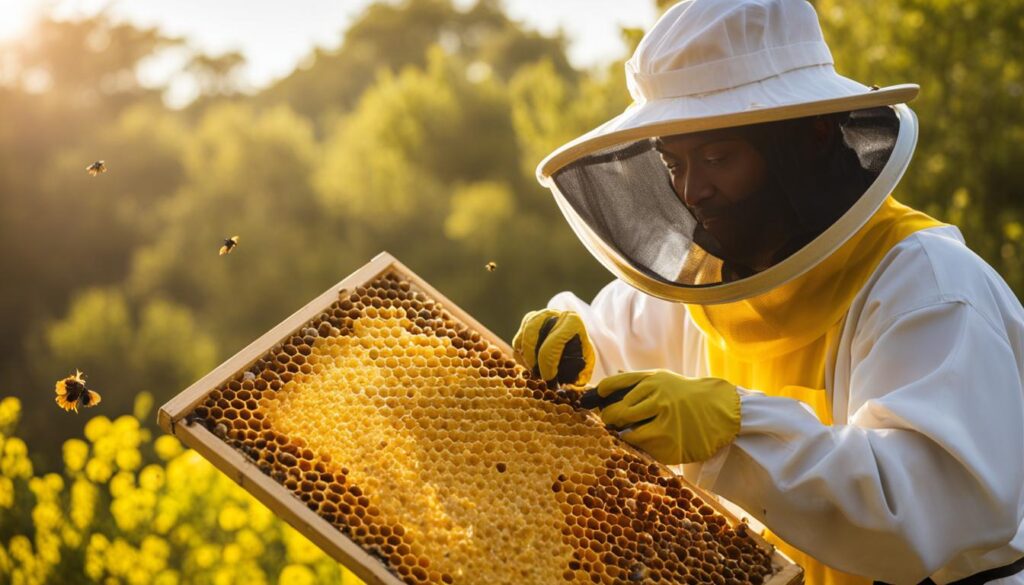
Centene Charitable Foundation Grant
The Centene Charitable Foundation is dedicated to supporting initiatives that promote inclusion, address social determinants of health, and improve healthcare access, social services, and education. Through its grant program, the foundation provides funding for organizations working in these areas, making it a potential source of financial support for beekeepers involved in educational programs, community health initiatives, and projects aimed at improving social services.
“The Centene Charitable Foundation aims to make a meaningful impact by supporting innovative programs that address critical community needs,” said John Smith, CEO of the foundation. “We believe that by investing in initiatives that promote inclusivity and improve access to essential services, we can create positive change and foster healthier and more vibrant communities.”
The foundation’s grant program is open to qualified nonprofit organizations that align with its mission and focus areas. Beekeepers looking to secure funding for educational initiatives, community health projects, or programs that enhance social services can consider applying for a Centene Charitable Foundation Grant. The foundation focuses on supporting initiatives that have the potential to make a lasting difference in the lives of individuals and communities.
| Grant Type | Description |
|---|---|
| Healthcare Access Grant | Funds projects that improve access to quality healthcare services for underserved populations. |
| Social Services Grant | Supports programs that address social determinants of health and enhance social services for vulnerable individuals and communities. |
| Education Grant | Provides funding for educational initiatives that promote learning opportunities and academic success. |

Charitable Contributions from Costco Wholesale
Costco Wholesale is committed to making a positive impact in communities through their charitable contributions. They focus on supporting programs that benefit children, education, and health and human services. By investing in these areas, Costco aims to create a better future for individuals and families.
One of the key areas of focus for Costco’s charitable contributions is children support programs. They recognize the importance of providing resources and opportunities for children to thrive. Through grants, Costco supports organizations that offer educational programs, mentorship initiatives, and access to basic needs for children in need.
In addition to children support, Costco Wholesale also contributes to education support programs. They believe that education is the foundation for success and empowerment. By providing funding to educational institutions and programs, Costco helps to create opportunities for students to pursue their goals and dreams.
Costco’s commitment to health and human services is also evident in their charitable contributions. They support programs that improve access to healthcare services, promote wellness, and address social issues. By partnering with organizations that strive to enhance the well-being of individuals and communities, Costco contributes to building healthier and more inclusive societies.
Table:
| Program | Description |
|---|---|
| Children Support Programs | Grants for educational programs, mentorship initiatives, and basic needs support for children. |
| Education Support Programs | Funding for educational institutions and programs to create opportunities for students. |
| Health and Human Services Support Programs | Supporting initiatives that improve access to healthcare services and address social issues. |
Costco Wholesale’s charitable contributions play a significant role in supporting various programs and initiatives. Beekeepers involved in educational initiatives, health projects, or community programs may be eligible to receive funding through Costco’s charitable efforts. Their commitment to making a positive difference in the lives of individuals and communities aligns with the values of beekeepers who are dedicated to their craft and the well-being of their communities.
Hearst Foundations’ Grant Opportunities
The Hearst Foundations offer grant programs that support nonprofit organizations addressing significant issues in culture, education, health, and social services. These grants provide funding for programs that make a positive impact in these areas and aim to improve access to high-quality education, promote the arts and sciences, enhance healthcare services, and tackle social and economic problems.
Beekeepers involved in various initiatives can potentially find funding opportunities through the Hearst Foundations. For example, cultural institutions focused on preserving and promoting art, history, and heritage can apply for grants that support their programs and exhibitions. Educational initiatives that aim to enhance learning experiences and promote equal access to education can also benefit from the Foundations’ support.
Additionally, the Hearst Foundations provide grants to healthcare programs and organizations that strive to improve healthcare services, particularly for underserved communities. Beekeepers involved in community health projects, initiatives that promote wellness and preventive care, or programs that address health disparities may find funding opportunities through the Foundations’ support.
The Foundations’ grant programs also extend to social services, including programs that address poverty, homelessness, and other societal challenges. Beekeepers involved in projects that support social services, such as job training programs, community development initiatives, or initiatives that empower vulnerable populations, may find funding opportunities through the Hearst Foundations.
Overall, the Hearst Foundations’ grant opportunities provide a diverse range of funding options for beekeepers engaged in culture, education, healthcare, and social service initiatives. By leveraging these grant programs, beekeepers can secure the financial support needed to further their important work and make a lasting impact in their communities.
| Grant Opportunities | Eligible Focus Areas |
|---|---|
| Culture | Preservation of art, history, and heritage |
| Education | Enhancing learning experiences, promoting equal access to education |
| Health | Improving healthcare services, addressing health disparities |
| Social Services | Addressing poverty, homelessness, and societal challenges |
Conclusion
Funding resources for personal passions, such as beekeeping, provide beekeepers with opportunities to finance their creative endeavors. Through various programs and grants, beekeepers can access the financial backing they need to pursue their passion projects.
The USDA offers a range of funding options for beekeepers, including insurance programs, disaster assistance programs, loan programs, and grants. These programs aim to strengthen the economic stability of beekeepers and rural communities, providing support for their beekeeping ventures.
Furthermore, foundations like the Centene Charitable Foundation, Costco Wholesale, and the Hearst Foundations also offer grant opportunities for beekeepers. By exploring these funding resources, beekeepers can secure the financial backing they require to pursue their passion pursuits.
With a multitude of funding options available, beekeepers can confidently embark on their beekeeping journey, knowing that financial support is within reach. By leveraging these opportunities, beekeepers can turn their passion for beekeeping into a thriving and sustainable venture.
FAQ
What programs does USDA offer for beekeepers?
USDA offers various programs and resources for beekeepers, including insurance programs, disaster assistance programs, loan programs, and grants.
What insurance programs are available for beekeepers?
USDA offers insurance programs specifically tailored for beekeepers, such as the Apiculture Rainfall Index Insurance Program (RI-API) and the Whole-Farm Revenue Protection insurance policy.
What disaster assistance programs can beekeepers access?
Beekeepers can access disaster assistance programs like the Emergency Livestock Assistance Program and the Noninsured Crop Disaster Assistance Program.
What loan programs are available for beekeepers?
USDA offers loan programs such as the Farm Loan Program and the Farm Storage Facility Loan Program to support beekeepers.
What grants are available for beekeepers through USDA?
Beekeepers can explore grants through programs like the Local Agriculture Market Program (LAMP) and the Small Business Innovation Research (SBIR) Program.
Are there other grant opportunities for beekeepers?
Yes, beekeepers can also consider grants from organizations like the Centene Charitable Foundation, Costco Wholesale, and the Hearst Foundations.
What does the Centene Charitable Foundation focus on?
The Centene Charitable Foundation focuses on initiatives that promote inclusion, address social determinants of health, and support healthcare access, social services, and education.
What kind of charitable contributions does Costco Wholesale offer?
Costco Wholesale offers charitable contributions that focus on programs supporting children, education, health, and human services in the communities where they operate.
What programs do the Hearst Foundations support?
The Hearst Foundations support nonprofit organizations that address significant issues in culture, education, health, and social services.

